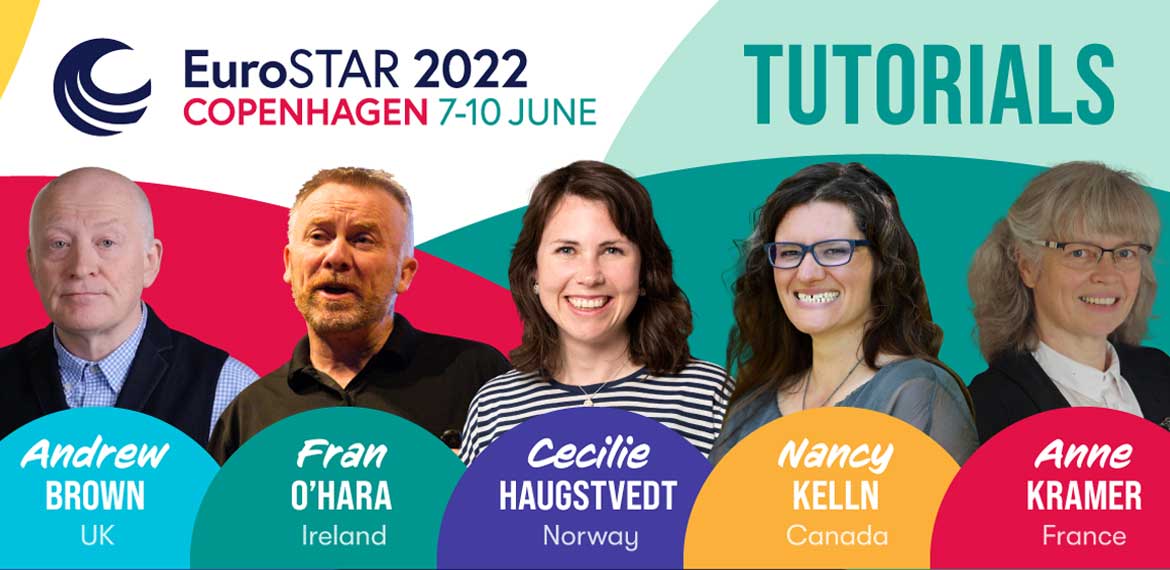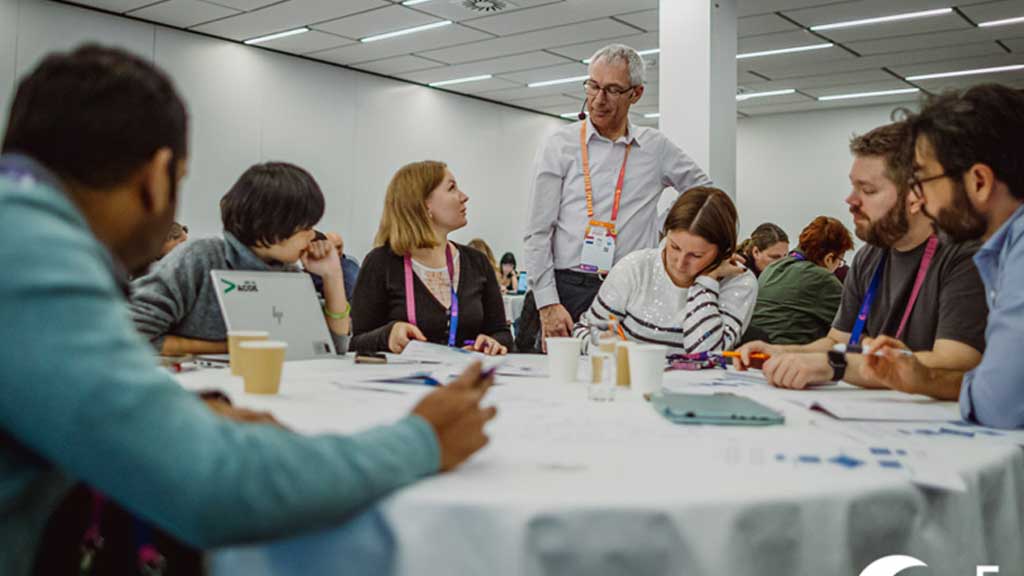
This year’s EuroSTAR tutorials feature 10 in-depth sessions from expert speakers. This is your chance to learn new skills through interactive group work, practical examples, and hands-on exercises. Our tutorial trainers will share their triumphs – and mistakes – so that you learn from real experience.
Want to learn more about how biases affect your testing? Improve your critical thinking skills? Learn new concepts and testing tools? This is where it all happens.
Full-day tutorials
1. Shaping testing – A simulation in scrum | Fran O’Hara
It’s reported that approximately 80% of agile organisations are using Scrum and its hybrids. However, the majority of organisations are still at the earlier stages in their evolution. One of the challenges they face is quality and testing. In this simulation at Fran’s tutorial, you’ll work as part of a Scrum team focusing solely on the test and quality-related aspects.
You’ll get insights, knowledge, and skills to help shape your team’s approach to quality and testing throughout the agile lifecycle. You’ll also be faced with a series of challenges/scenarios often faced by testers during the sprint. You’ll walk away with a toolbox of ways to solve the typical problems that impact on test and quality in Scrum.
2. Developing critical thinking skills for testers | Andrew Brown
Critical thinking skills are essential to testing – but rarely taught. We’re also vulnerable to cognitive biases and thinking traps when we test – that can catch out even the most seasoned tester. One of the most common thinking traps we face is that we tend to think in ways that confirm our existing beliefs, rather than challenging those beliefs.
This tutorial will reveal your vulnerability to this bias, then show you how to mitigate it. Throughout you’ll learn exercises to explore your biases, and how reasoning does not use logic – or at least not rational logic. Rather, we use logic based upon social permissions and cheater detection. You will use this to explore how to write better tests by rephrasing testing requirements in terms of social logic. At the end, you’ll have ways to improve your testing by enhancing your critical thinking skills.
3. Test design with data combination testing and classification trees | Rik Marselis
Test case design is one of the core competences of the quality engineering & testing profession. If you want to properly shape your testing, which test design technique(s) do you use? And is it effective and efficient? What coverage can you achieve? Rik explores the Data Combination Test design technique, which uses Classification Trees.
This technique can be combined with 3 different coverage types, so you have a great way to align with the risk level of the application. Join Rik’s tutorial on DCT & CT and start applying his techniques, the very next day you return to work.

4. Automate BDD scenarios with SpecFlow | Gáspar Nagy
SpecFlow is the official Cucumber implementation for .NET, and if you want to speed up automating BDD scenarios with SpecFlow, this workshop is for you. Gáspar will give you a very brief introduction to BDD/ATDD, the most important characteristics of good BDD scenarios, before getting into coding in order to learn about the most important features of SpecFlow.
This is your opportunity to learn about the BDD automation workflow, and see how the test-first approach can help you to get quick feedback about the quality. You’ll also see on what levels you can automate the application with BDD, and how to make a good mix of them to get a sustainable testing strategy.
Half-day tutorials
5. Questions, questions | James Lyndsay
At this interactive workshop, you’ll learn techniques to obtain more useful information quickly, ask the right questions at the right time, and learn where to go next. James will show you how to recognise types of questions, the contexts in which you might use them, and the people you might ask.
The tutorial also looks at ways you can use questions poorly: loaded and leading questions, questions designed to trick or trip, questions which go over the same ground, and other anti-patterns. You’ll know how to ask more purposeful and focused questions, and see the patterns, gaps and opportunities in your own questions.
6. From business workflows to automated tests | Anne Kramer
With the deployment of agile development practices, QA & testing teams are challenged by the acceleration of production releases, and the imperative of test automation. These challenges make test relevance, and the alignment of these tests with business needs, even more crucial. After all, what would be the economic justification of investing in automation and maintenance of tests that do not properly reflect the business needs?
This tutorial introduces you a visual TDD approach (Acceptance Test Driven Development). In this approach, the test requirements are expressed in graphical workflows. You’ll build a graphical test workflow for a simple functional scope proposed as a practical exercise. Learn how to express business needs and test requirements in the form of graphical workflows and appreciate the collaborative contribution of this visual representation.

7. Exploring context driven testing & exploratory testing | Nancy Kelln
More testers are gravitating towards using exploratory testing and context driven testing techniques in their organizations. However, as testers start to embrace these testing methodologies, they are uncovering questions in their implementation. In this half-day workshop, you’ll explore the various aspects of testing including test planning, test design, test execution, and test reporting, from the exploratory testing mindset.
You’ll also learn how to prepare your organization for the shift from more traditional methods to exploratory testing methods. You’ll leave with an understanding of how to implement exploratory testing concepts through all the phases of test planning, design, execution, and reporting.
8. Automatic accessibility testing for all | Cecilie Haugstvedt
In this workshop you’ll learn how to set up and write your own automatic accessibility tests using Axe and Cypress. You’ll write both unit tests and integration tests, and will look at what to test at each level. Cecilie will also cover some of the most common accessibility errors that can be discovered automatically, and learn how to fix them.
This workshop will be done in ensemble style – mob testing with small groups where the whole group works on the same thing, at the same time, in the same space, and at the same computer. You’ll leave understanding how to implement exploratory testing concepts through all the phases of test planning, design, execution and reporting.
9. Simplicity: distilling and refining test communication | Rick Tracy
This workshop, which uses the idea of simplifying how we communicate among ourselves and others, aims to distil the core results of testing into a much easier to understand message. Often we end up using too much industry jargon and test language, and this ends up diluting our message and the value of our communication. Once we’ve distilled the message to someone direct and valuable to all, we can much better target specific audiences with a refined message.
You’ll leave the workshop with a good understanding of why your valuable messages don’t always come across, what you can do about it, and how you can apply these skills regularly to your everyday work. You’ll explore several techniques to make a clear overall message, and to make refined valuable messages, no matter who the stakeholder is.
10. The good, the bad, and the biased | Emma Lilliestam & Hanna Schlander
How does the brain work? Why do biases exist, and what are the pros and cons of biases? In the workshop you’ll learn about two thinking systems in the brain, and four categories of biases. We are all biased. Biases affect our everyday lives, both at work and at home. By learning more about them we can expand our view, shape our minds, and improve our testing abilities!
You’ll get the chance to deep dive into biases in groups, and discuss a selection of our favorite biases, before presenting your findings to the group.
Excited to start learning? It’s our first in-person event in 2 years – and it’s going to be a massive celebration of testing! Soak up knowledge from 70 testing experts, and connect with your peers at Europe’s best testing event. Get your ticket now – book by April 22nd and save 10% on individual tickets; up to 35% on group bundles.